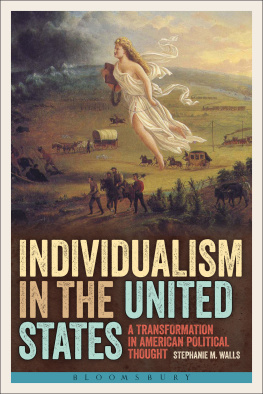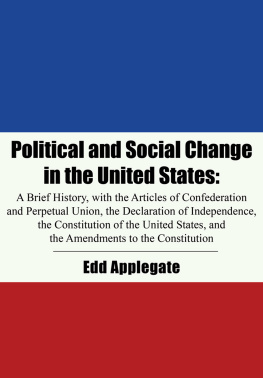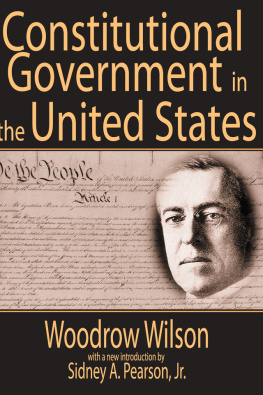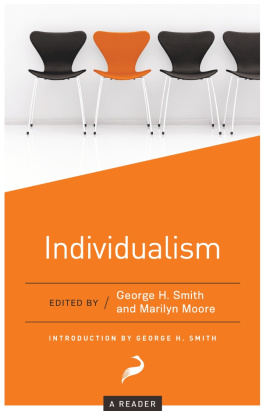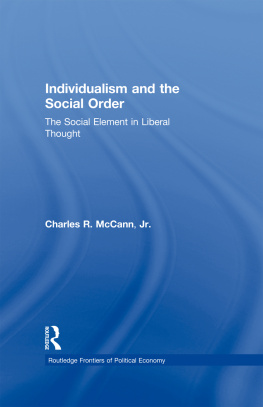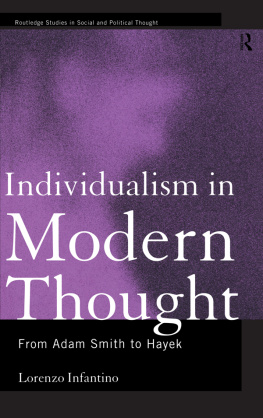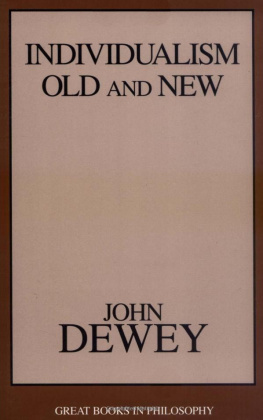This is a project that has been a work in progress for many years. I must thank my undergraduate political science professor at Ohio University, John Gilliom, for first inspiring me to consider and explore the topic of individualism. Many thanks also to the graduate faculty at the University of Cincinnati, especially: Mike Margolis, Steve Mockabee, and George Bishop. Thanks to Jeffrey Johnson for his insight and contributions to earlier drafts of Chapter 2 when it was a conference paper presented at the 2011 annual meeting of the Western Political Science Association. I want to thank my supportive colleagues at Bowling Green State UniversityFirelands College, who have been so encouraging and understanding throughout the time I have been working on this book.
Thanks again to John Gilliom, Jeffrey Johnson, and also Stephen Mergner for reviewing my book proposal and giving me excellent feedback to create a solid project. I am also indebted to David Harding for reading drafts of these chapters and providing me with invaluable editorial advice. Many thanks to Mary Beth Wade-Jones, for her assistance with the formatting, endnotes, and bibliographic work, and to Joe Wagner, for providing editorial assistance on Chapter 1. I am also grateful to those who reviewed the manuscript and gave me very useful insights to strengthen my arguments.
Lastly, and most importantly, I want to thank my family for their continued love and support of me and my career: my husband David, my children Lauren and Nick, and my mother, Janet. I could not have completed this book without you.
Every action done in company ought to be with some sign of respect to those that are present.
George Washington
It is with this one rule in mind that we embark on a study of the individual in the United States. We are not the first to the party, and we surely will not be the last. Our study of individualism will be with reference, and in deference, to those who have come before, but what we will accomplish in these pages will be unique in its design and approach. The topic of individualism is one of great political and social relevance to all, yet its discussion is scattered far and wide, in bits here and there, and almost always presented in a way that is only intellectually accessible to some. These pages are written and designed for the student of political science of any age, situation, or political orientation. Each chapter tells the story of a concept that has shaped our country and our way of life. Individualism is dynamic, and the chapters herein will explain that dynamism and show the ways it has changed and continues to change. The inspiration for this story began with observations made by a historian 100 years ago. Charles Merriams American Political Ideals planted the seeds for the framework I am presenting here.
When I first began to seriously contemplate the concept of individualism over 15 years ago as a college undergraduate, I was struck by its apparent inconsistency with democracy and several questions immediately came to mind: What does individualism really mean? Can one ever be truly and completely individualistic in thought and deed? What about community and society? Do the individual rights of the founding era mean the same thing that individualism means to people in the United States today? Does a commitment to individualism automatically lead to disengagement with others? If so, what does this mean for the viability of our democracy? I soon realized that it would take years to sort all of these things out. Only years after that would I realize that the journey would never truly be complete. However, thinking about these ideas, understanding the American fascination with the individual, and proposing a framework for how this concept has changed has given me many opportunities to try.
The purpose of this text is to bring individualism to the classroom, the coffee shop, the dinner table, and to make the topic come alive for those who do not yet know how important it is. Each chapter comes complete with discussion questions and suggested readings to aid in understanding the material. These tools will prove invaluable for contemplating and comprehending the ideas contained here. Discussion and application is vital to this pursuit, and it is my hope that this book will facilitate a worthwhile journey into this very important American ideal.
There has been much worthwhile scholarship devoted to the topic of individualism, and my goal herein is to present these various perspectives in a new way and bring them all together using my own argument as to how individualism has changed over time. I am certainly not the first one to suggest that individualism has changed since the founding, but I am bringing something new to the discussion through the way I characterize the transformation of the concept. In earlier drafts of this book, I had referred to the change in individualism as an evolution, which one of my reviewers thought was a mischaracterization of my argument. Indeed, the reviewer was correct. An evolution could suggest an improvement, and my conception of the changes that have occurred do not reflect an improvement at all. In fact, I believe that individualism has suffered a progressive deterioration, which has the ability to impact the very viability of American democracy now and in the future. With this in mind, know that this text is not just a historical perspective. It is a combination of the past and present so that we as American citizens might best know how to proceed into the future with the health of our society and government in mind. I believe that by looking to the past and understanding the original conception of individualism in the United States, we will realize that we hold the answers to our own problems.
There is some disagreement on this topic, but I believe that a healthy representative democracy requires an active citizenry: the more active, the better (not necessarily easier, but qualitatively better). The government must be responsive to the people, but understandably, it can reflect the will of only those who participate. Robert Putnam, in his influential work Bowling Alone, presents data to show how political activity has suffered a decline over the last several decades. I believe that the political process begins long before we step into the voting booth, and so the decrease in community participation that Putnam documents is of great concern to me as well. Many scholars have presented their explanation for why this decline has taken place, and I think that there is merit to these various explanations. The purpose of my book is not to refute these explanations. Rather, my objective is to provide the connections that bring all these explanations together under the umbrella of individualism. All the outwardly observable behaviors that serve to demonstrate and exacerbate the issue of disengagement are rooted in an internal ideological dilemma based on individualism.
In modern times, far too many people believe that the path to freedom is made clear by removing connections, obligations, and associations. We, as a people, have been taught these lessons for well over a century, but these lessons are as misguided as they are damaging for us as individuals and as a society. What many do not realize is that the lesson we have learned is not based on the political wisdom and goals of our Founding Fathers. The individualism that influences our attitudes today is the result of a great transformation and misapplication of the political individualism of the founding era. Though the term did not yet exist, the ideas of political individualism were of great importance to the Founders. The protection and advancement of the individual was something that made the American experiment unique and noteworthy, and it was a key component in creating the balance necessary between the government and the people, among the branches of government, and among the citizens themselves.

